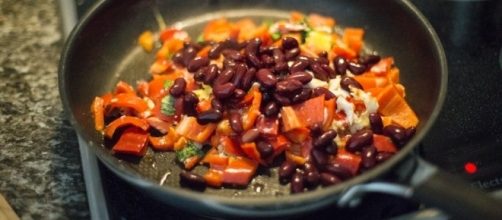There are many plant-based foods that are high in vitamins and minerals, but due to how our body works, as well as fiber, we might not be absorbing as much as we think we are. Simply combining a few whole foods can help increase absorption of these vitamins and minerals, and allow for a healthier diet.
Iron and Vitamin C
Iron is an important mineral that is found in abundance in plant foods, such as beans, legumes, leafy greens, nuts, and seeds. It is very important to eat enough in order to prevent iron-deficiency anemia. Most iron that we absorb in our diets comes from plant sources, as meat has very little iron in it, despite being better absorbed.
An easy way to increase absorption is to combine foods high in iron with a vitamin C rich food. Now that does not mean that you have to combine beans and oranges (gross), but mixing some bell peppers or broccoli with your lentils, for instance, will increase iron absorption without affecting taste.
Vitamin C rich foods also help with the absorption of Folic Acid, a B vitamin also found in foods such as beans and legumes.
Vitamin A and Fat
When we hear about Vitamin A, we think of carrots, and although that is true, foods such as butternut squash have much higher levels of this nutrient. This benefits eye health, as well as other important features in the body and although it is easy to get enough without increasing absorption rates, adding some healthy fats such as olive oil, seeds, or avocado, greatly increases how much we can get from the squash.
Another nutrient that increases Vitamin A absorption is Zinc which is found in beans, seeds, and grains.
Calcium and Vitamin D
Calcium is very important and can be found in fortified plant milk and leafy greens and is vital for the growth of strong bones. However, due to oxalates that are found in most leafy greens, calcium in foods like spinach can easily not be absorbed well. A good way to prevent this is to combine a calcium rich food with a Vitamin D rich food such as mushrooms with D2 in it, or just 20-minute walk in the sunlight, as our body is able to make all of the Vitamin D that we need when exposed to sunlight.
Now while it is possible to get all of these nutrients on a plant-based diet without food combining, doing this ensures health and prevents deficiency.
It's better to be safe than sorry when it comes to your health and a lot of these combinations work great in recipes too, such as sweet potato with olive oil, and beans with bell peppers. So make sure to combine foods in order to get the most out of your meal.


